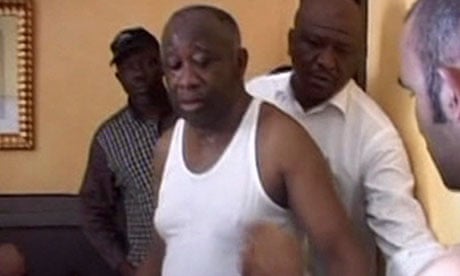World leaders have welcomed the sudden arrest of Ivory Coast's defiant former leader Laurent Gbagbo, but there were warnings that the conflict may not yet be over.
Having refused to stand down for four months after losing the presidential election, even as the country descended into civil war, Gbagbo was finally detained at his personal residence by forces loyal to the country's elected president, Alassane Ouattara. French troops and United Nations peacekeepers, who had earlier struck Gbagbo's home in the main city, Abidjan, from the air, provided crucial support.
"We attacked and forced in a part of the bunker," Issard Soumahro, a pro-Ouattara fighter at the scene, told Associated Press. "He was there with his wife and his son. He wasn't hurt, but he was tired and his cheek was swollen from where a soldier had slapped him."
The UN secretary-general, Ban Ki-moon, said that Gbagbo's arrest marked the "end of a chapter that should never have been". The US secretary of state, Hillary Clinton, said it "sends a strong signal to dictators and tyrants throughout the region and around the world".
Youssoufou Bamba, Ouattara's ambassador to the UN, said: "The nightmare is over for the people of Ivory Coast."
Gbagbo, who has been hiding in a bunker under his house for a week, was interrogated and then taken to the Golf hotel, where Ouattara has been based under UN protection since early December. UN peacekeeping chief Alain Le Roy said that Gbagbo and his influential wife Simone were being held under guard in an apartment at the hotel.
"To my knowledge, most of the fighting has stopped but there are pockets of resistance," said Le Roy.
Abidjan has been the scene of fierce fighting for the past week after Ouattara's forces swept down from the north, his stronghold, after becoming frustrated by Gbagbo's refusal to consider stepping aside. They were aided by peacekeepers from the UN and Ivory Coast's former colonial ruler, France, which estimated that Gbagbo had about 1,000 men still loyal to him by the end of last week.
Following the arrest, Ouattara's appointed prime minister, Guillaume Soro, called on these troops to switch sides. "To all the forces, I make a last appeal to rally [with us] … there cannot be a manhunt," Soro said, in an address to the Ivorian people on the French television station I-Télé.
But some analysts warned that the conflict, which has cost more than 1,500 lives, would be difficult to end, especially because of the French role in removing Gbagbo. The former president, once a history professor and who studied at the Sorbonne, had portrayed the conflict as a fight against foreign forces, and France's Licorne peacekeepers in particular.
"This is just the start of the crisis," said Kwesi Aning, head of research at the Kofi Annan International Peacekeeping Centre in Ghana. "The role of French Licorne forces undermines Ouattara's credibility. There may be a lull for a couple of months, but certainly there will be attacks to try to reverse this defeat."
The deep divisions in Ivory Coast, which has been split into north and south since the brief 2002 civil war, mean that Ouattara will have to tread carefully in his handling of Gbagbo, who over the past decade stoked xenophobia aimed at Ivorians whose parents or grandparents came from neighbouring countries. And for all his failings, which included repeatedly postponing elections to stay in power, Gbagbo still commanded a lot of support, winning 46% of the vote in November.
Ouattara's ambassador to France, Ali Coulibaly, told French radio that Gbagbo would be "treated with humanity".
"We must not in any way make a royal gift to Laurent Gbagbo in making him a martyr. He must be alive and he must answer for the crimes against humanity that he committed," he said.
Few doubt that such charges are true. By the end, Gbagbo was abandoned by all his allies, even in Africa, for refusing to negotiate his surrender, even as his forces were killing hundreds of people.
William Hague, the foreign secretary, accused Gbagbo of acting against democratic principles, but called for the former president to be treated with respect. Speaking in London after a meeting with his Italian counterpart, Franco Frattini, Hague said: "Mr Gbagbo has acted against any democratic principles in the way he has behaved in recent months and of course there have been many, many breaches of any rule of law as well. At the same time, we would say that he must be treated with respect, and any judicial process that follows should be a fair and properly organised judicial process.
"Above all, we all hope that this is now an opportunity for the people of that country who have been through so much in recent months to find a democratic way forward, a more peaceful way forward, for reconciliation to take place in that country."
Clinton said that other leaders who refuse to step aside after free and fair elections should now realise "there will be consequences for those who cling to power".
The EU welcomed "Ouattara's will to bring peace and justice to Ivory Coast", but said he needed to ensure that the perpetrators of crimes against civilians face justice. This includes members of his own forces, who have been accused of massacres during their march on Abidjan.
